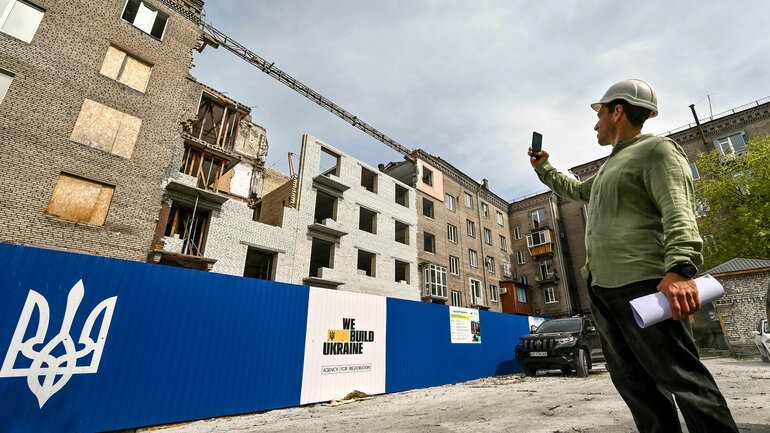Ukraine’s Recovery and EU Accession: The Importance of Inclusive Participation
The Ukraine Recovery Conference on 11–12 June will emphasise the need to involve a broad range of societal stakeholders in Ukraine’s recovery. But the implementation of this principle at the intersection of the country’s processes of recovery and EU accession is far from straightforward.

When participants at the Ukraine Recovery Conference 2024 meet in Berlin this week, they will discuss how the country can be rebuilt and modernised successfully. To this end, the conference will emphasise a whole-of-society approach and bring together representatives of local administrations, independent business associations, and civil society organisations as well as Ukrainian and international experts. The conference’s emphasis on cooperation is particularly timely, as the preparations for Ukraine’s accession to the EU also highlight the need for inclusive participation.
The processes of recovery and EU accession can both develop a top-down dynamic that gives the executive considerable leeway in decision-making. However, the experiences of other recovery processes show that it is essential to take into account other stakeholders from politics, business, and civil society. Similarly, previous rounds of EU enlargement have demonstrated that the implementation of EU rules depends on the capacities of various societal actors as well as the incentives offered to them. Thus, inclusive participation is not only essential for both recovery and EU accession: it can also be part of a mechanism that ensures a strong link between the two processes.
Two aspects should inform the commitment to inclusive participation in the context of Ukraine’s recovery and EU accession. Firstly, participation can take different forms, depending on the purpose it aims to fulfil. Secondly, it is necessary to decide which stakeholders should be involved and how to ensure their participation serves the intended purposes and mitigates underlying power asymmetries.
Why inclusive participation is useful
Relevant stakeholders can be involved in political decision-making processes in different ways. These include the exchange of information and knowledge, the exercise of monitoring functions, and direct influence over political decisions. In Ukraine’s case, the latter would enable relevant stakeholders to adapt the country’s recovery priorities to a changing context, or to decide on the measures they consider most helpful for implementing EU rules on the ground.
Accordingly, inclusivity can serve various purposes, which can change as the participation process unfolds. Steps to improve the quality of decisions based on the outputs of hearings, inquiries, and advisory committees fulfil a functional purpose. Inclusive participation can have a political purpose if it aims to increase stakeholders’ identification with the decision-making process. There is a clear link here with democratic resilience, as inclusivity can strengthen civic engagement and increase trust in political institutions. In the Ukrainian context, inclusive participation also goes hand in hand with ongoing decentralisation efforts.
Furthermore, inclusive participation can have a societal purpose as it may help develop social capital by bringing together different actors, including those who are marginalised or vulnerable, who may otherwise have little contact with each other and feel alienated from national policy-making.
Whom to involve and how
The purpose of inclusive participation should determine which stakeholders are involved and how. Communities affected by the decisions to be taken should be engaged alongside experts if inclusive participation is to serve a functional purpose, such as improving the quality of those decisions. This can allow for the valuable integration of local and professional knowledge. For example, residents can often provide insights into a local context that may be lacking from national or international experts on, say, housing or public recreation.
In a similar vein, when thinking about strategies to stimulate economic competitiveness in Ukraine, the national government’s Ukraine Plan and the EU’s Ukraine Facility emphasise small and medium-sized enterprises. However, fostering competitiveness also requires coalitions of companies, research institutes, universities, vocational training institutions, regulatory bodies, and investment agencies. Technical assistance and capacity-building programmes should therefore take an inclusive approach that can pool resources and knowledge of logistics, technological expertise, and marketing skills to meet the particular needs of specific sectors.
Participation that aims to serve a political purpose should include vulnerable groups emerging from the war and marginalised stakeholders, such as lower-income groups, through public hearings and other formats of engagement. It is essential to devise mechanisms to involve Ukrainians who are currently based outside Ukraine and may be unable or unwilling to return to the country in the foreseeable future.
Similarly, if inclusive participation is to help build social capital, it is important to ensure diversity when selecting relevant stakeholders. Diversity is likely to result in conflict, at least initially, but it may help ensure a common understanding of the process, lead to a more widely shared commitment to the policies adopted, and pave the way for more innovative solutions.
It is also important to be aware of potential power asymmetries among stakeholders, develop procedures to guide inclusive participation accordingly, and provide relevant stakeholders with the necessary resources to participate. Representatives of, for example, larger enterprises or associations may face no barriers in speaking at public hearings, while ordinary citizens or representatives of smaller, grass-roots initiatives may benefit from encouragement through workshops or deliberative polling.
In terms of procedures, if the aim of the engagement is simply to inform, then consensus building among stakeholders is inappropriate. However, if inclusive participation is to serve a political purpose, such as increasing identification with the decision-making process, appropriate techniques may include public hearings, workshops, or deliberative polling.
In sum, a crucial challenge for the Ukraine Recovery Conference and subsequent policy-making on the country’s processes of recovery and EU accession is to institutionalise inclusive participation and imbue it with a political purpose. This is the key to generating and maintaining stakeholders’ trust and commitment and, in turn, to strengthening democracy.
Gwendolyn Sasse is the Director of ZOiS. Julia Langbein heads the Political Economy and Integration Research Cluster at ZOiS.